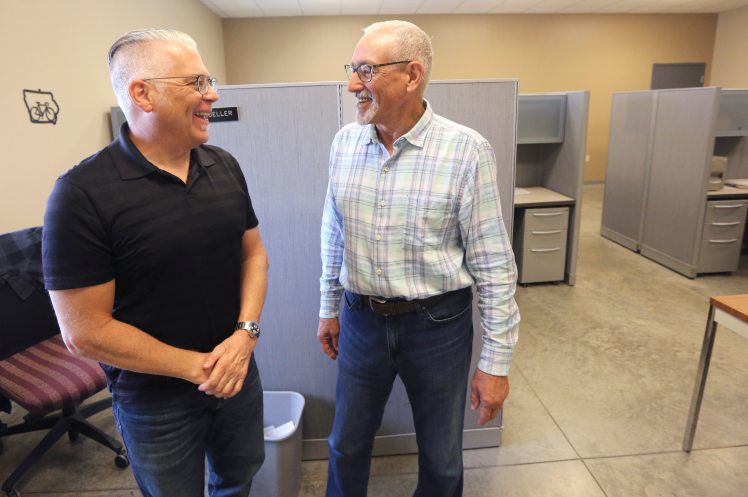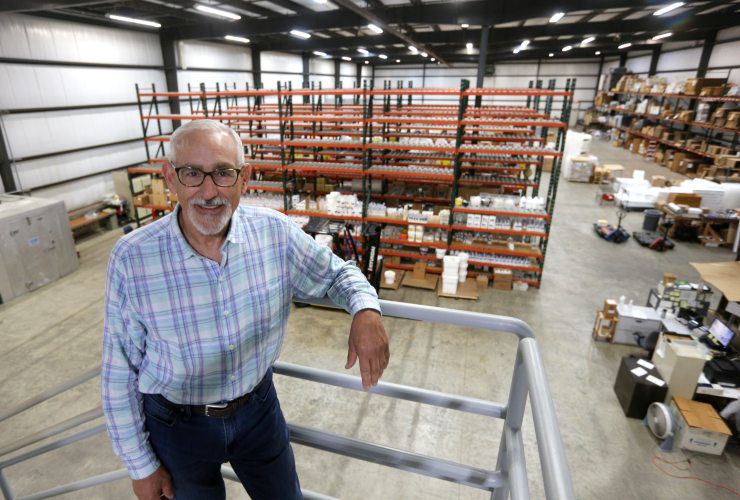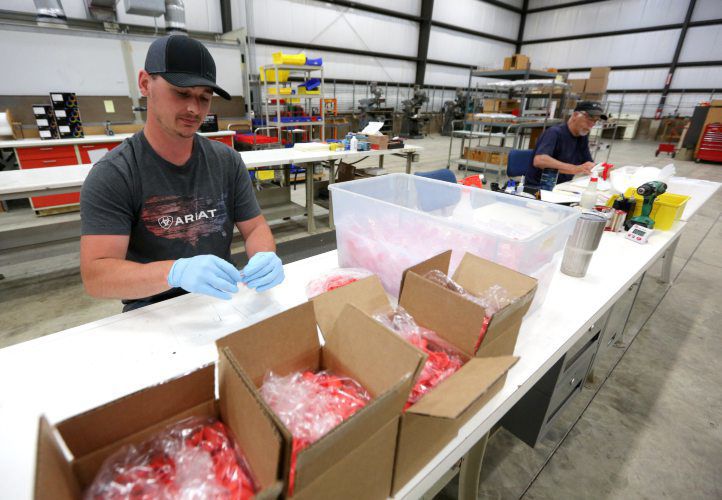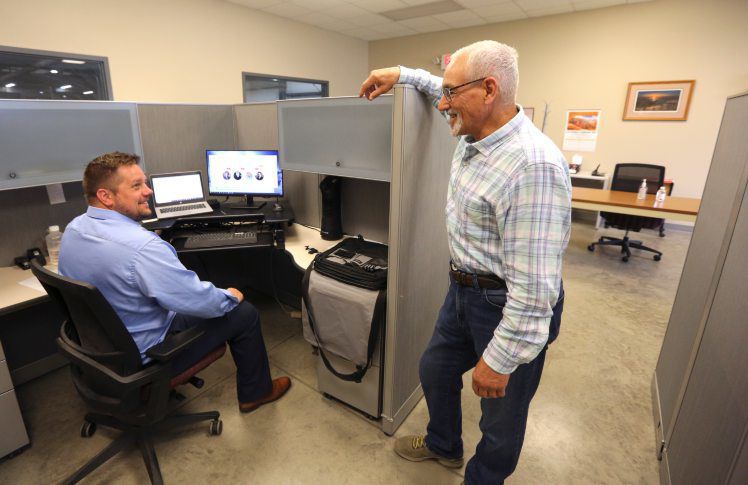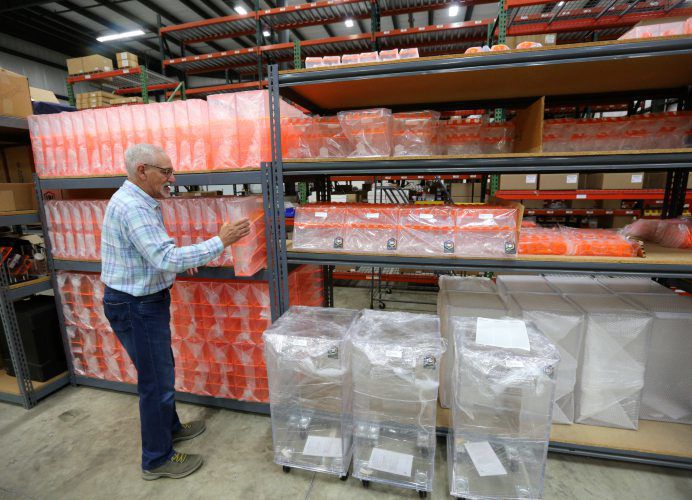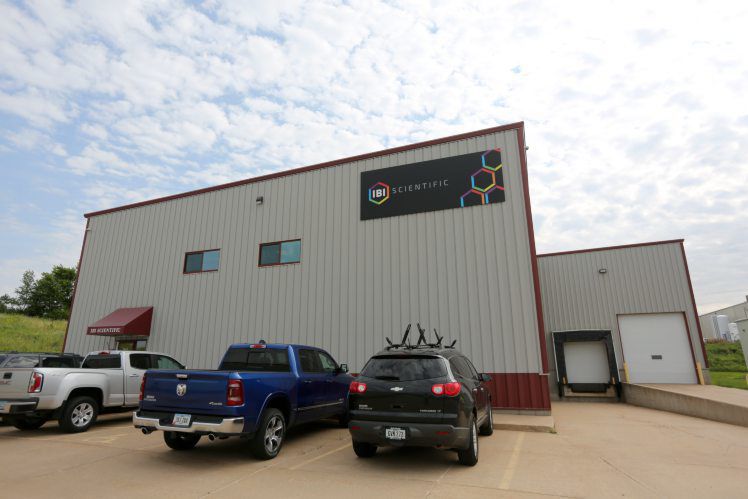With medical news reported daily in the COVID-19 era, the field of life science research is more prominent than ever.
In Dubuque, a business called IBI Scientific is producing products, such as Belly Dancer shakers, for researchers while responding to industry changes and challenges.
“IBI manufactures bench-top, electro-mechanical equipment for use in the Life Science Laboratory,” said vice president Pat Mueller. “The products are entirely manufactured here in the USA … nearly all components within a 50-mile radius of Dubuque.”
Life science research is the study of living organisms, according to the World Health Organization. Scientists might work in biology, biomedical, biotechnology, genomics, pharmaceutical or other types of research.
IBI’s products mainly are geared for molecular biologists and microbiologists.
“These scientists dive into the molecular/cellular world of life — plants, animals and humans … equipment such as the Belly Dancer and Belly Button are used to grow cells,” Mueller said.
Cells could be plant, cancer or other types. For example, research scientists grow and collect cells from a plastic container processed on a Belly Dancer shaker. Then, they might use additional IBI equipment, including extraction kits, to obtain cell DNA information.
“If it was a cancer cell, the genome information could be crucial to treatment,” said Mueller. “If it was a plant cell, it may tell if the RoundUp herbicide gene is present.”
Originally, Mueller, along with John Stork who is IBI’s president, worked at Barnstead/Thermolyne in Dubuque managing acquisitions. When that company was purchased, the timing was right to branch out on its own.
In 2004, after a search, Stork and Mueller purchased Shelton Scientific-IBI, then located in Connecticut.
“(We chose) the life sciences niche due to it being the fastest growing segment of the laboratory market worldwide,” Stork said.
They established IBI in Peosta, Iowa, then moved the company to its Dubuque location. According to Mueller, they chose this area for its manufacturing capabilities based on their knowledge of other facilities around the globe.
“Initially, capital and local awareness were challenges, but due to excellent cooperation from local institutions like Dupaco (and more) … our needs were met,” Stork said. “The local business community has much to offer, especially personnel talent who easily adapt to our market needs.”
Once open for business, IBI established itself as one of two area companies providing equipment to this market, according to Mueller. IBI makes products for segments of growth in life science research.
“Our target customers are any and all life science research institutions whether they conduct pharmaceutical research, plan biotech research, animal health research or medical research,” Mueller said.
In addition to making shakers, IBI’s product categories include lab accessories, radiation protection equipment, ultra pure water, lab animal products and culture media. The products are used in research laboratories, educational institutions and medical facilities.
Clients include the University of Iowa, Medical Research, in Iowa City; National Animal Disease Center in Ames; Mayo Clinic in Rochester, Minn.; and LaJolla (Calif.) Institute of Immunology. IBI serves private and public research facilities worldwide.
When the COVID-19 pandemic hit, IBI faced a new landscape of issues and priorities.
Initially, Katie Swoboda, marketing and sales manager, who joined IBI two years ago, said “the COVID-19 pandemic really slowed down our website traffic … A lot of (our customers) work at colleges and universities, which have been shut down.”
She said IBI had to adjust its focus to immediate industry concerns in addition to the usual product line. For research in progress, the pandemic prompted questions on product/material availability and supply chain management.
“The lab equipment products that we manufacture are made up of PC boards, electric motors, sheet metal and machined parts,” Mueller said. “Luckily, these are all made right here in Eastern Iowa/Dubuque area, so local sourcing and vertical integration has really helped us.”
Fundamental to progress in life science research, according to the World Health Organization, is “strengthening public health responses to natural, accidental or deliberate epidemics with both benefits and risks for public health.”
In the unexpectedly altered world of late, Mueller and Stork agreed the pandemic offered business opportunities for their company. New product offerings helped to balance changes in the demand for standard products.
Recently, IBI added manufacturing of personal protective equipment (PPEs), such as acrylic shields, sanitation products and COVID-19 research test kits.
“We have been able to keep plenty of stock and ship orders out quickly,” Swoboda said.
IBI distributes PPEs to local businesses, as well.
“Development of a vaccine or cure falls into the hands of life science researchers around the world,” Stork said. IBI’s product portfolio helps support that effort, and the company also makes a kit to detect the COVID-19 virus.
IBI has grown from five employees to a staff of 10 with many from Iowa. With areas of expertise ranging from engineering to business, Mueller noted those who relocate here say they appreciate Dubuque’s landscape, recreational activities and family-friendly community.
Employees also appreciate the opportunity for professional progress.
“Many young professionals prefer to work for smaller companies where they have more latitude in their daily duties,” Mueller said. “They are more empowered and can feel a sense of belonging and ownership.”
As a company, IBI is progressing, as well. In 2012, Stork said IBI acquired Stovall Life Sciences to advance market share and diversify product selection. Other plans include increasing staff, building the customer base, developing new products and bringing more manufacturing onsite.
“There are unlimited opportunities for IBI Scientific to grow within our market niche,” said Stork. “The opportunity to meet unique people in research and (to support) unique research being done allows us to be at the forefront in many situations. Each day carries the promise of something new.”


